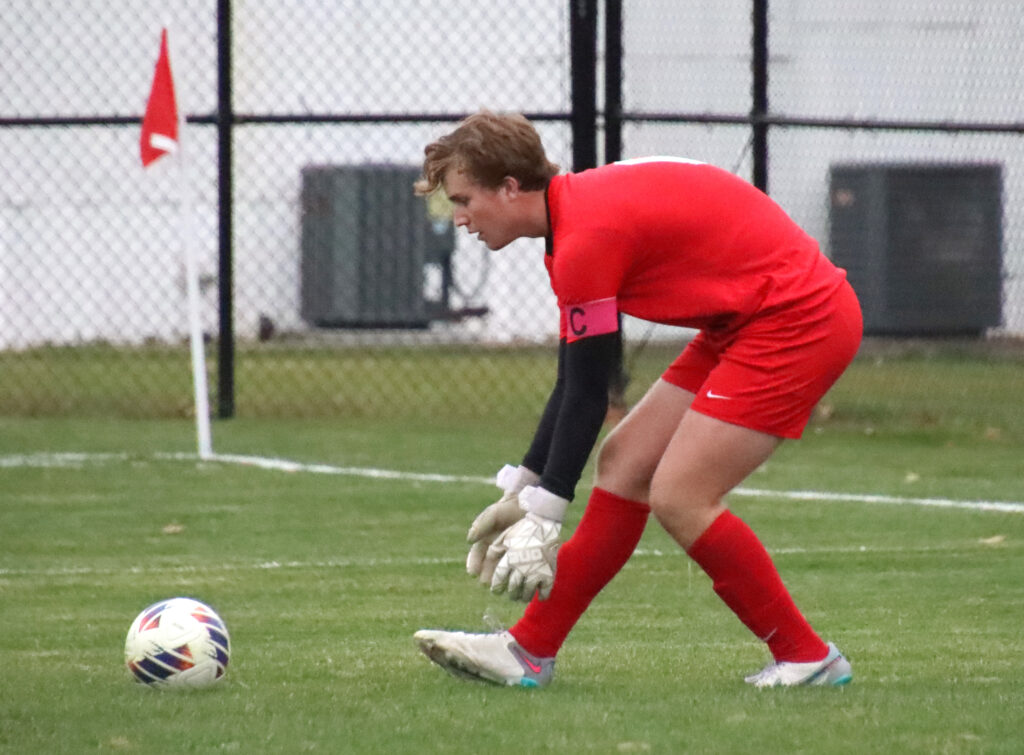Interpretation of ‘ball in hand’ rule results in red card for QND goalkeeper, could keep Frericks out of sectional semifinal

MONMOUTH, Ill. — The definition of a “ball in hand” is going to determine if Max Frericks will be the Quincy Notre Dame boys soccer team’s starting goalkeeper come Saturday.
Right now, sophomore Carter Hankins needs to be ready to fill that role.
Frericks, the senior goalkeeper who was the backstop on last year’s Class 1A state championship team, received a red card for double touching a ball in the box midway through the second half of Wednesday’s Class 1A regional championship game against Monmouth-Roseville at Pattee Fields.
The Raiders led 4-0 at the time and finished with a 5-2 victory, but the loss of Frericks would be significant.
The red card results in a one-game suspension, meaning Frericks will miss the sectional semifinal at noon Saturday against Mendota at Chillicothe IVC. QND plans to appeal the red card to the Illinois High School Association.
“I’m going to have to do some digging and make some phone calls,” QND coach Greg Reis said.
Reis said the referee explained the call as illegal double touching.
On a run across the top of the box from left to right, Monmouth-Roseville forward Ozzy Carmona ripped a shot Frericks saved diving to his left near the post. Frericks used his hands and arms to stop the shot, but he never picked the ball up.
Subsequently, he dribbled the ball to the top of the box and picked it up when the Titans’ Alexis Bruntsh ran forward as if to attack.
That’s when the referee whistled the play dead, issued the red card and sent Frericks off. The referee ran to the linesman to explain his call and then approached the QND bench to offer an explanation to Reis.
He said the referee told him Frericks had the ball in hand because “he had one hand on top of it and one hand behind it, and that constitutes ball in hand.”
According to the International Football Association Board’s Laws of the Game, a goalkeeper “is considered to be in control of the ball with the hand(s) when”:
• The ball is between the hands or between the hand and any surface (e.g. ground, own body) or by touching it with any part of the hands or arms, except if the ball rebounds from the goalkeeper or the goalkeeper has made a save;
• Holding the ball in the outstretched open hand;
• or bouncing it on the ground or throwing it in the air.
When Frericks picked up the ball after dribbling it out, he stopped “an obvious goal-scoring chance,” in the referee’s opinion.
“It’s called a double touch, and a double touch is supposed to be an indirect free kick,” Reis said.
Instead, Monmouth-Roseville was awarded a penalty kick, which it converted.
Rules revolving around a second touch by a goalkeeper were amended in 2020 by the IFAB to read, “A goalkeeper can receive a caution (yellow card) or be sent off (red card) for ‘illegally’ touching the ball a second time after a restart (e.g. goal kick, free kick etc.) even if the touch is with the hand/arm.”
According to the IFAB explanation of the rule, “If the goalkeeper takes a restart and then deliberately plays the ball a second time (before it has touched another player) and this ‘illegal’ second touch ‘stops a promising attack’ or ‘denies a goal or an obvious goal-scoring opportunity,’ in addition to the indirect free kick, the goalkeeper must be cautioned or sent off.”
The severity of the infraction and whether it deserves a yellow or red card is subject to the referee’s interpretation of the rule and the play.
Miss Clipping Out Stories to Save for Later?
Click the Purchase Story button below to order a print of this story. We will print it for you on matte photo paper to keep forever.
